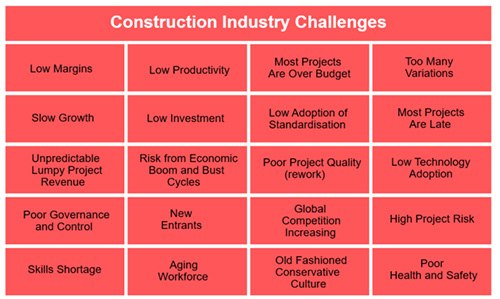 The Engineering and Construction industry is facing the biggest storm of disruption in its history. What should companies be doing to tackle these challenges head on to come out as a winner?
The Engineering and Construction industry is facing the biggest storm of disruption in its history. What should companies be doing to tackle these challenges head on to come out as a winner?
Identifying Construction Industry Challenges
The challenges shown below are significant. Companies that identify the causes and take action to reduce or eliminate these issues will thrive in the future. There is a huge business opportunity for companies that can adapt quickly.

There are many initiatives that can address these challenges. Some companies are investing in building information modeling (BIM) or apprentice training programs. Others are considering how they can use drone technology and wondering whether offsite/modular construction might be the path forward.
But we ask ourselves, “are these companies tackling their challenges from a strategic viewpoint?”
A Strategic Viewpoint
Our observation is that most companies are executing reactive tactical initiatives to deal with these serious disruptive threats. As a result, the progress is usually slow, and they’re not realizing much business value.
There are new entrants investing in the industry that are taking a longer-term, strategic approach. This represents an increasing threat to traditional contractors who aren’t willing to invest in changing the way they operate. Perhaps there’s a more fundamental change that’s needed. One that will enable your company to challenge the norm and be the industry disruptor of the future.
Patchwork Is Not The Answer
Think about the business systems landscape most companies use in the construction industry. They usually have a finance system that’s often not project centric in its design. As a result, many of the industry financial control requirements are not satisfied by their financial system. The users then turn to Excel to give them better control of their projects.
For example, Excel is commonly used to manage the month end project cost reporting process, project cash flow forecasting, variation or contract change management, revenue recognition calculations, accruals, indemnities and insurances, risk management, etc.
Even more, the rest of the business is typically using a patchwork quilt of systems and Excel with little or no integration.
ERP For Construction
The first step to improving your business is establishing strong governance and control. The business systems landscape described above isn’t good enough to succeed in the future. You need an integrated approach that provides management with a trusted and timely set of project and business information for business decisions.
The engineering and construction industry rarely uses the term ERP. But when it is used, it’s usually considered a back-office finance and human resources solution, not the foundation for the project operational execution. It’s therefore no surprise that many companies haven’t realized value from their business system or ERP implementation.
Most ERP solutions are not capable of managing the project financial control and operation processes in a construction business. If the right solution is chosen a far more ambitious set of business value objectives can be realized.
Business Value Engineering Approach
A properly managed ERP project can be the critical foundation to tackle these significant business challenges. By taking a Business Value Engineering approach to the implementation we can identify the business challenges and execute a strategic plan to realize true business value. Business value opportunities include:
- Project and company margins
- Project delivery performance (time, cost, risk, quality, safety)
- Growth
- Productivity (RPA, processes, equipment automation, better planning).
- Attract best people and employee retention
- Improved business agility (easier to adapt to new business models)
Final Thoughts
In summary, a Business Value Engineering approach combined with the right construction centric ERP solution can give your business the right foundation to meet the industry challenges and make your business more successful by realizing real business value.
Find out more about how IFS can deliver true business value.



Post a comment to this article
Report Abusive Comment